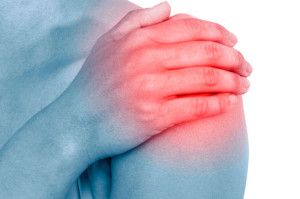The rotator cuff is a set of four muscles and tendons responsible for moving the shoulder and for maintaining shoulder stability. If the rotator cuff tears, it can result in significant symptoms. Untreated rotator cuff tears can lead to more serious conditions, so treatment is important. 
Causes
Rotator cuff tears are common among athletes who use the shoulder a lot, like swimmers and tennis players. They may occur suddenly due to trauma, especially if the shoulder is already vulnerable due to over-training. In addition, rotator cuff tears may develop slowly over time as a result of overuse of the shoulder.
Non-athletes can also develop rotator cuff tears. Older people are the most vulnerable, and rotator cuff tears in non-athletes usually result from trauma such as a fall or a car accident.
Symptoms
If the rotator cuff is torn suddenly as a result of trauma, it may be immediately obvious that something is wrong. There may be a tearing sensation or a popping sound, and the pain and other symptoms will onset immediately. The pain may be severe.
On the other hand, overuse injuries can be ignored until they are severe as they become the “new normal,” so it is important for athletes to be aware of their body and limitations when training.
Some symptoms of rotator cuff injuries include:
- Pain, especially when moving the arm overhead
- Shoulder weakness
- Limited shoulder range of motion
Potential Treatment
Sometimes, it is possible to manage minor tears with physical therapy and anti-inflammatory drugs. The potential for this type of treatment depends on how active the patient is and where the tear is located. Non-surgical treatment is particularly preferable for older, less active individuals.
Moderate to severe tears will not heal on their own. Therefore, surgery is often required to treat a tear to the rotator cuff. Rotator cuff tear surgery can be be performed arthroscopically, so that no general anesthesia or hospital stay are required. However, the recovery time is lengthy even when minimally invasive surgery is used. For athletes, a tear may mean an end to the season, although it may be possible to cross-train during the recovery period.
It is essential to see a doctor if symptoms of a rotator cuff tear or other injuries are present. If an athlete continues to train on an injured shoulder, it can lead to more severe problems, including osteoarthritis of the shoulder. Although taking time away from training can be difficult to do, trying to work through an injury is never a good idea.
Dr. Howard Marans is the top doctor for rotator cuff tears in Orange County. Dr. Marans would be happy to meet with you about your shoulder injury. To schedule a consultation today, please click below and enter your information or call OC Orthopedic at 714.979.8981.